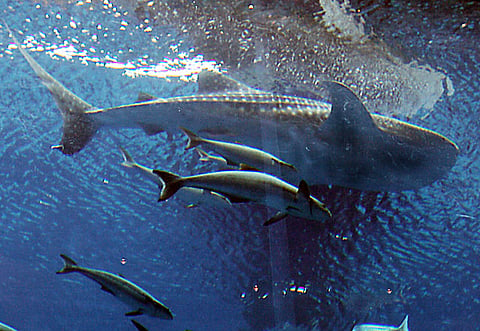Satellite tag reveals tale of shark Sammy in the wild
Sammy, the shark released from Dubai, has travelled almost 350km in 33 days

Dubai: The 33-day journey of a juvenile whale shark through the Arabian Gulf has been mapped thanks to a satellite tag which offers a glimpse of the movements of these gentle giants — in the case of Sammy, she travelled almost 350km.
Little is known about the whale shark population transiting through the Arabian Gulf but extra tags are ready to be deployed by Dubai hotel Atlantis, The Palm, to find out more, said Steve Kaiser, vice-president of Marine Science and Engineering at Atlantis.
The hotel bought five satellite ‘pop up' tags from the Mote Centre for Shark Research in the US which received information from Sammy's tag on April 20. The satellite tag was designed to pop to the surface after 100 days but in Sammy's case, her tag popped up after just 33 days.
Caught in August 2008, the female juvenile whale shark was apparently spotted in distress and brought back to health in the hotel's 11 million litre Ambassador Lagoon.
Scepticism still surrounds the release of the whale shark due to lack of photographs circulated to the media.
"I don't know how you can fake that data," said Kaiser. "Sceptics will be sceptics no matter what we say. We will not be able to convince them… We had an animal that we rescued and our position has always been that at the right time of the year — typically between April and June are the peak months they travel through — we would release it. We decided to do it early because sea temperatures were rising quicker than previous years," he said.
The tag reveals that between March 18 and April 20 Sammy experienced temperatures of between 22.6°C and 26.8°C, came to the surface at least once each day, and dived as deep as 72 metres.
She travelled in a mostly westward path through the Arabian Gulf, travelling south of Iran and then curving southward to waters off the coast of Qatar, ending up about 348km west of her starting point.
Kaiser told Gulf News he was "thrilled" that the whale shark had been tracked but disappointed only 33 days of data had been collected. Of the remaining four tags three have been sent back to Mote for maintenance and one is left to tag "more animals".
"Our goal has always been to tag whale sharks and to educate people about marine animals… I picked whale sharks here because it is a very unique place. Whale sharks are showing up in marinas and ports and I haven't heard of that happening anywhere else."



